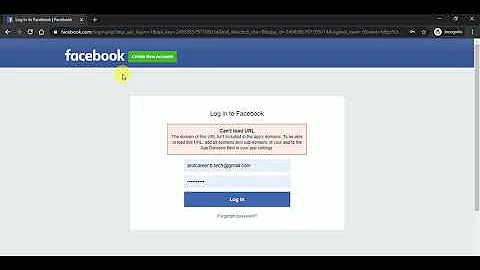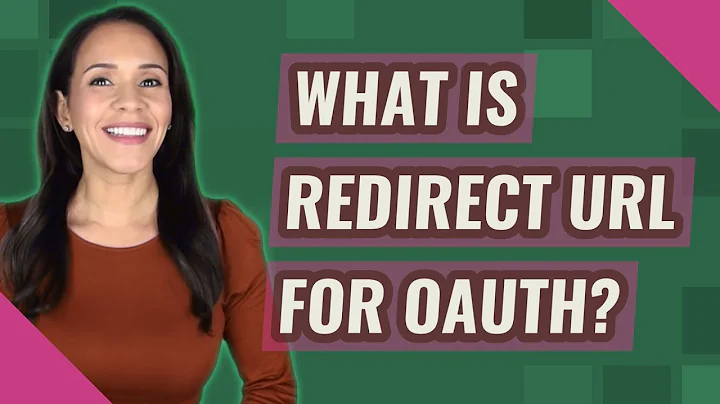Facebook OAuth: custom callback_uri parameters
Solution 1
I figured out the answer; rather than adding additional parameters to the redirect URL, you can add a state parameter to the request to https://www.facebook.com/dialog/oauth:
https://www.facebook.com/dialog/oauth
?client_id=MY_CLIENT_ID
&scope=MY_SCOPE
&redirect_uri=http%3A%2F%2Fwww.mysite.com%2Foauth_callback%3Ffoo%3Dbar
&state=6234
That state parameter is then passed to the callback URL.
Solution 2
If, for any reason, you can't use the option that Jacob suggested as it's my case, you can urlencode your redirect_uri parameter before passing it and it will work, even with a complete querystring like foo=bar&morefoo=morebar in it.
Solution 3
I was trying to implement a Facebook login workflow against API v2.9 following this tutorial. I tried the solutions described above. Manuel's answer is sort of correct, but what I observed is url encoding is not needed. Plus, you can only pass one parameter. Only the first query parameter will be considered, the rest will be ignored. Here is an example,
Request a code via
https://www.facebook.com/v2.9/dialog/oauth?client_id={app-id}&redirect_uri=http://{url}/login-redirect?myExtraParameter={some-value}You'd get a callback for your url. It will look like
http://{url}/login-redirect?code={code-from-facebook}&myExtraParameter={value-passed-in-step-1}. Note that facebook would make a callback withmyExtraParameter. You can extract the value formyExtraParameterfrom callback url.Then you can request access token with
https://graph.facebook.com/v2.9/oauth/access_token?client_id={app-id}&client_secret={app-secret}&code={code-from-facebook}&redirect_uri=http://{url}/login-redirect?myExtraParameter={value-extracted-in-step-2}
Additional parameter passed in step 1 after the first query parameter will be ignored. Also make sure to not include any invalid characters in your query parameter (see this for more information).
Related videos on Youtube
Comments
-
 Jacob almost 2 years
Jacob almost 2 yearsI'd like to have a dynamic redirect URL for my Facebook OAuth2 integration. For example, if my redirect URL is this in my Facebook app:
http://www.mysite.com/oauth_callback?foo=bar
I'd like the redirect URL for a specific request be something like this, so that on the server, I have some context about how to process the auth code:
http://www.mysite.com/oauth_callback?foo=bar&user=6234
My redirect gets invoked after the authorization dialog is submitted, and I get back an auth code, but when I try to get my access token, I'm getting an OAuthException error back from Facebook. My request looks like this (line breaks added for clarity):
https://graph.facebook.com/oauth/access_token ?client_id=MY_CLIENT_ID &redirect_uri=http%3A%2F%2Fwww.mysite.com%2Foauth_callback%3Ffoo%3Dbar%26user%3D6234 &client_secret=MY_SECRET &code=RECEIVED_CODEAll of my parameters are URL-encoded, and the code looks valid, so my only guess is that the problem parameter is my redirect_uri. I've tried setting
redirect_urito all of the following, to no avail:- The actual URL of the request to my site
- The URL of the request to my site, minus the
codeparameter - The URL specified in my Facebook application's configuration
Are custom redirect URI parameters supported? If so, am I specifying them correctly? If not, will I be forced to set a cookie, or is there some better pattern for supplying context to my web site?
-
superscral over 12 yearsBut state parameter can only contains number characters, isn't it?
-
 Jacob over 12 yearsNo, it can contain any arbitrary data. At the time I wrote this, I was putting a whole JSON object in that parameter (URL-encoded, of course).
Jacob over 12 yearsNo, it can contain any arbitrary data. At the time I wrote this, I was putting a whole JSON object in that parameter (URL-encoded, of course). -
CMCDragonkai over 10 yearsCould you give an example?
-
CMCDragonkai over 10 yearsThe state is intended for a random unguessable hash to prevent CSRF. Is there a way to resolve this?
-
 Jacob over 10 yearsInteresting, their documentation didn't make mention that it was for CSRF originally. However, this doesn't change the fact that it seems to be the only way they give to pass arbitrary data. I suppose you could make your state parameter a JSON structure containing both a nonce and your state data, or the nonce only to use for looking up the rest of the information.
Jacob over 10 yearsInteresting, their documentation didn't make mention that it was for CSRF originally. However, this doesn't change the fact that it seems to be the only way they give to pass arbitrary data. I suppose you could make your state parameter a JSON structure containing both a nonce and your state data, or the nonce only to use for looking up the rest of the information. -
azzaxp over 10 yearsGreat Answer..! I used this for facebook. But how do we do the same for twitter. It is not working :(
-
Erik Kaplun over 9 yearsIt used to work for me this way and then just stopped; now "sharing" the
stateparameter for both XSRF protection as well as my own ID is the solution for me. -
 cb24 over 7 yearsPerhaps a bit old, but the state param is explained here: developers.facebook.com/docs/facebook-login/…
cb24 over 7 yearsPerhaps a bit old, but the state param is explained here: developers.facebook.com/docs/facebook-login/… -
 tenderloin over 7 yearsThis does not work anymore, at least not in my case. It is only returning the first query string parameter when redirecting back from authentication.
tenderloin over 7 yearsThis does not work anymore, at least not in my case. It is only returning the first query string parameter when redirecting back from authentication. -
hellboy about 7 yearsWhy should I store custom redirect params in
state? -
 Jacob almost 7 yearsMaybe the Facebook server is being forgiving, but you absolutely should URL-encode
Jacob almost 7 yearsMaybe the Facebook server is being forgiving, but you absolutely should URL-encoderedirect_uri; it is not valid to have an unencoded second?in the URL nor&s, since it makes the parameter list ambiguous. If you URL-encode, you don't have to worry about avoiding "invalid characters" in the parameter. Your additional parameters are probably "ignored" because of your lack of encoding&(how could it differentiate between it being a parameter separator or part ofcallback_uriotherwise?) -
 Puneet almost 6 years@mert I have added my callback url in ` Valid OAuth Redirect URIs` of Facebook login product under
Puneet almost 6 years@mert I have added my callback url in ` Valid OAuth Redirect URIs` of Facebook login product underClient OAuth Settingswithout adding additional parameters. It is not working in my caseURL Blocked: This redirect failed because the redirect URI is not whitelisted in the app’s Client OAuth Settings. Make sure Client and Web OAuth Login are on and add all your app domains as Valid OAuth Redirect URIs. -
Abdul Fatah over 5 yearsauth0 allows extra query params in callback urls, but sadly facebook and twitter don't :(










